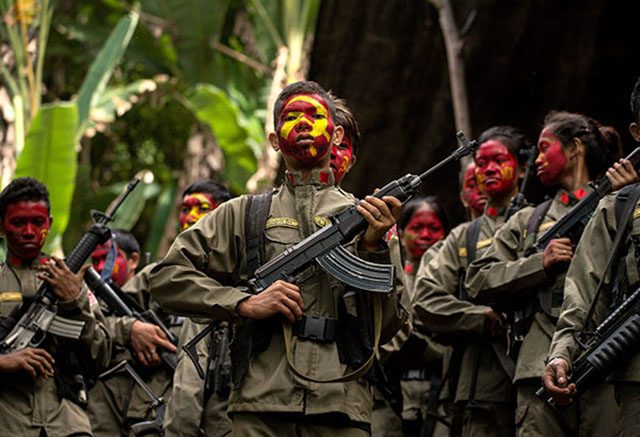
President Rodrigo Duterte in his latest national address mentioned martial law again, this time, as a threat to alleged lawlessness of communist rebels who disrupt the flow of relief goods for Filipinos affected by the quarantine measures.
In his recorded address televised on Friday morning, Duterte warned the public of the possibility of martial law declarion, citing the New People’s Army’s alleged theft of aid meant for the people.
“I am warning everybody and putting notice sa [to the] armed forces and the police, I might declare martial law,” Duterte said.
“’Pag nagpatuloy kayo ng lawlessness niyo, and it is happening all over the Philippines, maybe I will declare martial law,” he added.
Duterte did not elaborate the incident or reason why he made the accusation against the rebel group.
When he started to impose travel restrictions early last March, Duterte had been consistent in making “shoot to kill” remarks and threatening public arrests and detention of quarantine violators during his televised addresses on COVID-19.
The national government extended the standing enhanced community quarantine until May 15. It was supposed to end on April 30.
A new directive called general community quarantine was also imposed on provinces and regions considered moderate-risk or low-risk in spreading the virus that cause COVID-19.
Similar justification as the 1972 martial law declaration
Several Filipinos criticized Duterte’s renewed martial law threat and claimed that the late dictator Ferdinand Marcos also used the same argument as the current president’s to justify placing the Philippines under martial law in September 1972.
“Duterte threatens to declare Martial Law on the basis that communist rebels for causing violence. This is the same justification Marcos used to declare Martial Law,” activist Iñigo Abellar said.
Twitter user @kimbefinosa recalled Duterte’s close ties with the rebel group by sharing old photos of him with NPA members in public events.
https://t.co/uOsY07SO69 pic.twitter.com/KFBGACDty3
— jak—kim #OustDuterte (@kimbefinosa) April 24, 2020
A 2018 report of ANCx detailed that in 1972, Marcos thought that the NPA, “equipped with new weapons from China, posed a serious challenge to the government,” convincing him to declare martial law in September of that year.
Meanwhile, another Twitter user criticized Duterte’s inconsistencies in his remarks on military rule and the national budget for COVID-19 response.
DUTERTE:
"I never said I will declare Martial Law."
*4min later*
"I might declare Martial Law"Also, DUTERTE:
"We are running low of funds"
*5min later*
"I will increase the bounty to 50M for those who will be able to discover a vaccine."DUDE! MAKE UP YOUR MIND!
— Justin",) (@iJUSTINjoylife) April 24, 2020
Prior to this national address, there were reports of recent clashes between government forces and the NPA.
Last Tuesday, two soldiers were reportedly killed by some armed NPA guerillas in Aurora province.
These violent encounters occurred despite the Communist Party of the Philippines’ previous declaration of a unilateral ceasefire until April 30. The NPA is the armed wing of the CPP.
The government’s ceasefire, meanwhile, ended last April 15.
These incidents, however, does not warrant the declaration of martial law as stated by the Constitution.
Article VII (Executive Department) Section 18 of the 19887 Constitution states that:
“In case of invasion or rebellion, when the public safety requires it, he may, for a period not exceeding sixty days, suspend the privilege of the writ of habeas corpus or place the Philippines or any part thereof under martial law.”
‘AFP never went on ceasefire’
The CPP condemned Duterte’s renewed pronouncements against the NPA and claimed that the Armed Forces of the Philippines never went on ceasefire since the start of the outbreak.
“The AFP never went on ceasefire, even when Duterte ordered a suspension of offensive operations last March 19 to April 15, deploying troops to more than 350 barangays and 120 towns to conduct counterinsurgency, mounting at least 24 offensives and six aerial bombardments,” the CPP’s statement read.
The CPP also accused government troops of hampering the NPA’s response efforts in guerilla zones and areas “where Duterte’s government does not exist.”
“The AFP has stepped up its counterinsurgency drive to prevent the NPA from conducting its own public health campaign in response to the Covid-19 and economic and production work to help the people cope with the sharp economic downturn,” it said.
The party also echoed the sentiments of critics online, that is, Duterte might be using the health crisis to establish military control over the country.
“Duterte wants to kill democracy, at a time when democracy is needed to mobilize the people in a mass campaign of screening and testing to detect and isolate the virus and break its chain of transmission,” it said.
False NPA attacks?
Other Filipinos cited the previous contradicting reports of an alleged theft of relief goods by NPA members in the Balangiga town in Eastern Samar early this month in their criticisms against Duterte.
duterte: i will declare martial if the NPA tries to steal relief goods again
Also duterte and this administration on creating fake news about the NPA: pic.twitter.com/L5HPAxXG3X— chingu (@chingoals) April 24, 2020
“After his admin spreads fake news about NPAs attacking relief teams, Duterte threatens to implement martial law if NPAs continue to attack relief teams,” activist Chad Booc said.
Last April 7, state-run People’s Television carried a story titled titled “NPA robs relief goods in Eastern Samar.”
The press release of the Philippine Army stated that the incident supposedly happened in Sitio Bangon, Barangay Guinmaayohan on April 7, at 9 a.m.
However, One News quoted a barangay official named Adela Ogale as saying that she distributed relief goods to the residents there at around the same time. She went there with other barangay officials and staff from the Municipal Disaster Risk Reduction Management.
The Palace and military officials maintained that the theft indeed happened.
“The NPA action caused a shortage of relief packs… leaving other supposed beneficiaries with nothing,” Col. Camilo Ligayo, commander of the 601st Infantry Brigade, was quoted by the Philippine Star report as saying.









